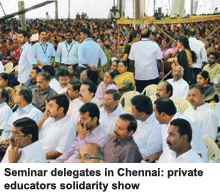In a massive show of strength and unity, more than 60,000 representatives of school managements, correspondents and teachers from over 2,500 private and matriculation schools across Tamil Nadu (affiliated with the Board of Matriculation Schools till class X and with the Tamil Nadu State Examination Board (TNSEB) at the higher secondary level) convened on January 29 on the vast open grounds of Chennai’s St. George Anglo-Indian Higher Secondary School to protest the K-12 education policies of the state government, and participate in a ‘Quality Education for Progressive Tamil Nadu’ seminar organised by four associations of private schools. The seminar featured 25 eminent speakers from private schools and school management associations across Tamil Nadu, Delhi, Maha-rashtra and Karnataka, who expressed their solidarity with the cause of private education in Tamil Nadu and India.
 The conflict between private matriculation school managements and the state government has been simmering for over a year following the ruling DMK government’s decision to ‘regulate’ the state’s 5,934 private matriculation schools. On January 11 last year the state government legislated the Uniform System of School Education Act 2010, which abolished the state’s Matriculation, Anglo Indian and Oriental School examination boards and decreed a common curriculum and textbooks for all schools forcibly affiliated with TNSEB. Primary-secondaries affiliated with the pan-India Delhi-based Central Board of Secondary Education (CBSE) and Council for Indian School Certificate Examinations (CISCE) were specifically exempted by the Act.
The conflict between private matriculation school managements and the state government has been simmering for over a year following the ruling DMK government’s decision to ‘regulate’ the state’s 5,934 private matriculation schools. On January 11 last year the state government legislated the Uniform System of School Education Act 2010, which abolished the state’s Matriculation, Anglo Indian and Oriental School examination boards and decreed a common curriculum and textbooks for all schools forcibly affiliated with TNSEB. Primary-secondaries affiliated with the pan-India Delhi-based Central Board of Secondary Education (CBSE) and Council for Indian School Certificate Examinations (CISCE) were specifically exempted by the Act.
Since then this equal standard or samacheer kalvi legislation has been strongly opposed by parents and teachers of private matriculation schools in particular. Anticipating that their children won’t be adequately prepared to write national entrance examinations in the future, many parents have rushed to enrol their children in the state’s 200 CBSE-affiliated schools which don’t have the capacity to meet the onrush.
Moreover, to compound the prob-lems of private schools, under the Tamil Nadu Schools (Regulation of Collection of Fee) Act, 2009 the state government decreed a new fees structure determined by the government-appointed Govind-arajan Committee. This fees structure is applicable to all 5,934 private unaided matriculation schools and also to 5,000 private nursery and primary schools affiliated with the Directorate of Elementary Education of Tamil Nadu. Inevitably the fees structure recom-mended by the Govindarajan Committee has forced matriculation, private nurseries and primary schools to slash tuition fees by 60 percent.
Eminent speakers at the convention discussed these regulations imposed upon private schools by the state government, and appealed to it to consider the 11-point resolution passed by the convention. The resolution called upon the state government to review the unviable tuition fees structure, the no-detention- till-class VIII policy; protect teachers’ rights to take disciplinary action against students; allow schools the freedom to choose textbooks of their choice and maintain quality within the samacheer kalvi framework; con-tinue to grant property tax exemption for panchayat school buildings, withdrawn recently; adopt the three-language learning formula in schools; permit schools to renew their recognition every five years instead of three years, and grant them permanent recognition after ten years. It also called upon the Central government to review the Right to Free and Compulsory Education Act, 2009 (RTE Act).
Although private school manage-ments and convenors of the seminar don’t expect any response to their 11-point resolution given that the state legislative assembly election is sched-uled for this summer, privately they predict a huge setback for the scandals-ridden DMK government for recklessly interfering and leveling down K-12 education in this southern littoral state which prides itself for its relatively high education standards. “The DMK government is fooling itself and the public if it believes that by mandating matriculation schools’ higher secondary students to write the TNSEB class XII exam, it is creating a level playing field for students from decrepit government schools. Because of the superior infrast-ructure and faculty of matriculation schools, their students will top the dumbed down TNSEB Plus Two exam. Simultaneously the DMK leadership has antagonised the state’s large middle class vote bank by diluting education standards in private schools. Their leaders are very stupid to believe that they will derive electoral mileage out of their reckless interventions in the K-12 education system,” says a ruling party politician who attended the seminar but requested anonymity.
“The focus of the state government should be on upgrading the deplorable standards of government schools instead of leveling down private school education by introducing samacheer kalvi and other such populist measures,” said G. Vishwanathan, a former politi-cian turned educationist and promoter-vice chancellor of the highly-reputed VIT University, Vellore while addressing the seminar.
But leveling up is a stiffer proposition than leveling down.
Hemalatha Raghupathi (Chennai)